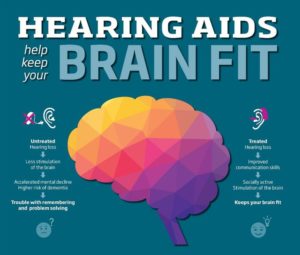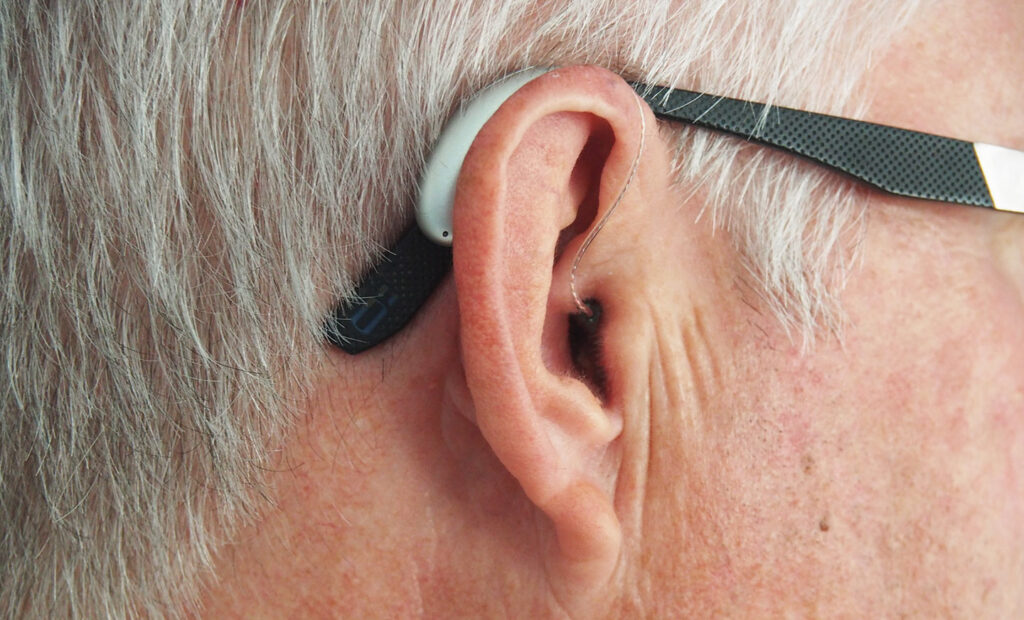Dementia
Dementia is an umbrella term for a set of symptoms caused by disorders affecting the brain. Symptoms include memory loss, and difficulties with thinking, problem-solving or language. These symptoms can be severe enough to reduce a person’s ability to perform everyday tasks. Because dementia is progressive, the symptoms will gradually get worse as more brain cells get damaged and die. It is not, however, a specific disease. Many diseases can cause dementia, such as Alzheimer’s, Lewy Body disease, frontotemporal dementia, Creutzfeldt-Jakob disease, Parkinson’s, and Huntington’s, as well as head trauma. These conditions all have similar and overlapping symptoms.
Links between Dementia and Hearing Loss
The less you use your brain, the more likely you are to develop dementia. When the hearing part of your brain grows inactive, it results in tissue loss and changes in brain structure. Studies show that the brains of those with hearing loss, atrophy (shrink) faster than those with normal hearing.
Untreated hearing loss can lead to living in isolation because people with untreated hearing loss are more likely to experience loneliness, worry, depression, anxiety, and paranoia – making them less likely/willing to participate in organized and casual social activities. When someone isolates themselves, their risk for cognitive disorders increases.
As well, your brain has to work harder to process sound if you don’t hear well, taking away resources/focus from other important activities, such as remembering, thinking, and acting. This further enables dementia and other cognitive disorders to develop.
How Hearing Aids Can Help

If you already have a cognitive disorder, hearing loss can aggravate symptoms. Overall, hearing impairment makes it hard to listen, reply, and respond to someone speaking, which can increase feelings of confusion, isolation, and paranoia. Hearing aids improve your hearing, but they also help preserve independence, mental abilities, emotional and physical health, and work/home/social lives. A full life keeps your brain active, therefore reducing your risk for a cognitive disorder. A study completed by the American Journal of Epidemiology found that hearing aids helped slow the rate of memory decline and improved Alzheimer’s patients’ quality of life.
Here at Life Hearing Solutions, we offer free hearing tests and consultations. Visit https://www.lifehearingsolutions.com/en/life-hearing-solutions-clinics/, or just call 289-755-0295 today to book an appointment!
Works Cited:
Alzheimer Society Canada. (n.d.). What is dementia? Retrieved on August 19, 2019 from https://alzheimer.ca/en/Home/About-dementia/What-is-dementia.
Beltone. (n.d.). The link between hearing loss and Alzheimer’s disease. Retrieved on August 14, 2019 from https://www.beltone.com/en-us/hearing-loss/types-and-causes-of-hearing-loss/alzheimers-and-hearing-loss.
Crawford Medical. (n.d.). Hearing Aids help keep your Brain Fit [Hearing aids help keep your brain fit infographic.]. Retrieved August 20, 2019, from https://www.crawfordmedical.co.nz/news/2018/3/28/dementia-and-cognitive-decline-the-hidden-risks-of-hearing-loss.
Deal, J. A., Sharrett, A. R., Albert, M. S., Coresh, J., Mosley, T. H., Knopman, D., . . . Lin, F. R. (April 4, 2015). Hearing Impairment and Cognitive Decline: A Pilot Study Conducted Within the Atherosclerosis Risk in Communities Neurocognitive Study. Retrieved August 20, 2019, from https://academic.oup.com/aje/article/181/9/680/84516.
Lin, F. R., Albert, M. (August 1, 2015). Hearing Loss and Dementia – Who’s Listening? Retrieved on August 14, 2019 from https://www.ncbi.nlm.nih.gov/pmc/articles/PMC4075051/?xtor=AL-32280680.
Martin, D. S. (n.d.). Hearing Loss and Dementia: The Silent Connection. Retrieved on August 14, 2019 from https://www.webmd.com/healthy-aging/features/hearing-loss-dementia#1.



I greatly appreciate your explanation of how hearing loss can eventually lead to feelings of loneliness. This sounds extremely urgent to take care of considering how my mother seems to ask us to repeat whatever we say very frequently. I’ll get her treated by a hearing testing doctor so we can help her get what she needs.
Do you grant permission for me to add this content to my dataset? I want to make it clear that I’m gathering this data for my personal hobby as a data scientist, and citing the source is integral to my approach. Here my campus page at Kampus Terbaik Thanks! ID : CMT-LOKZTXRNPAY3LLYPWP
Thanks for your attention!
Nice post. I learn something totally new and challenging on websites